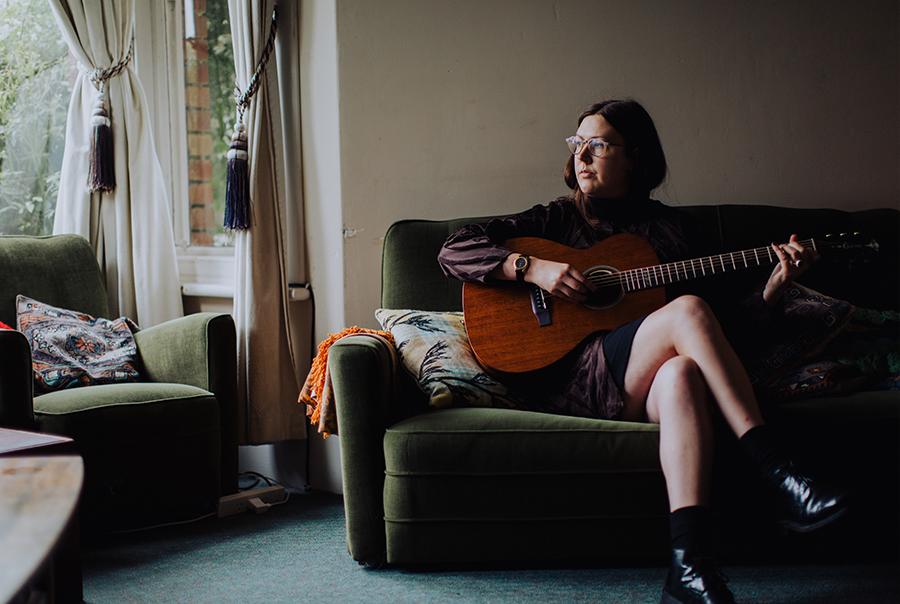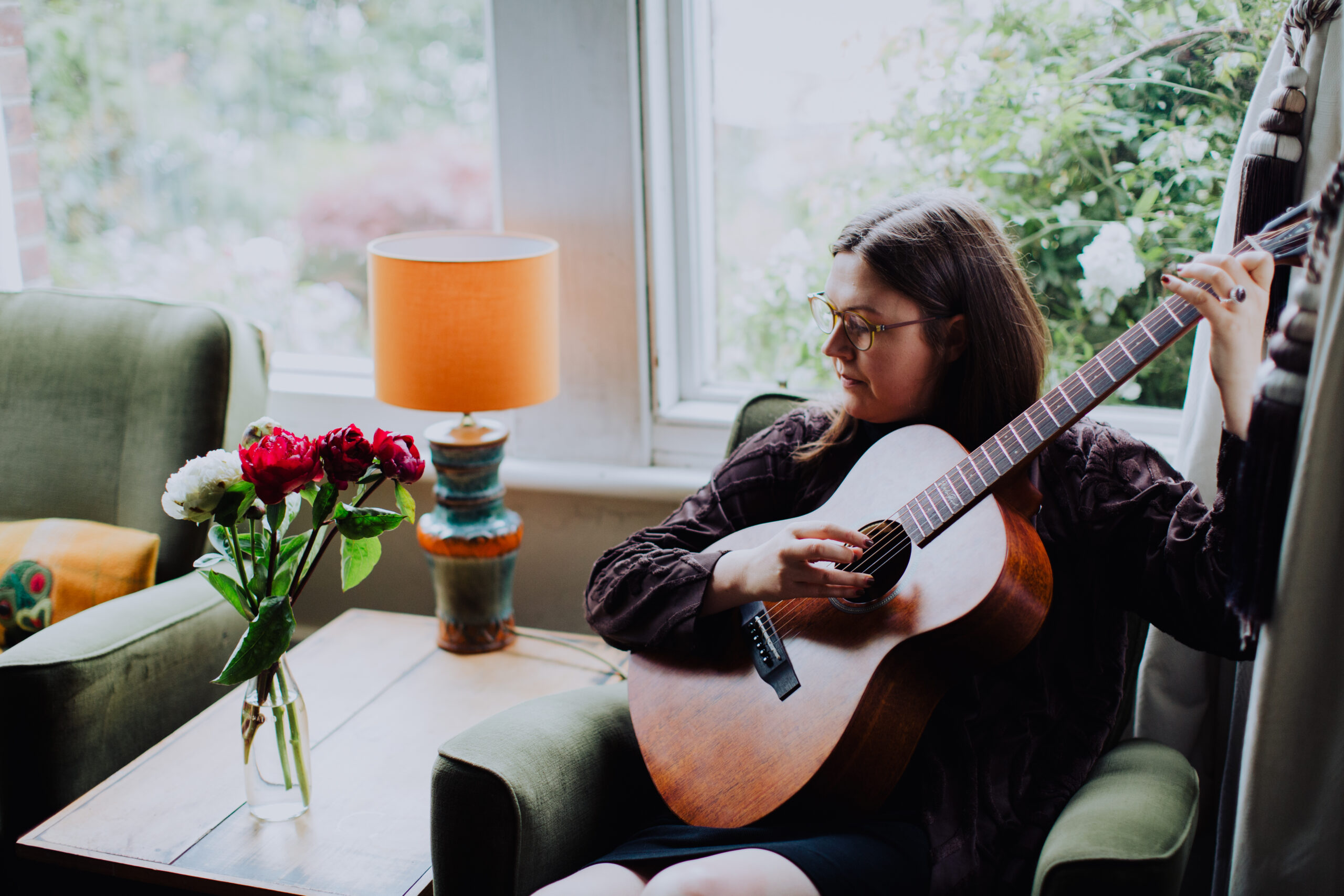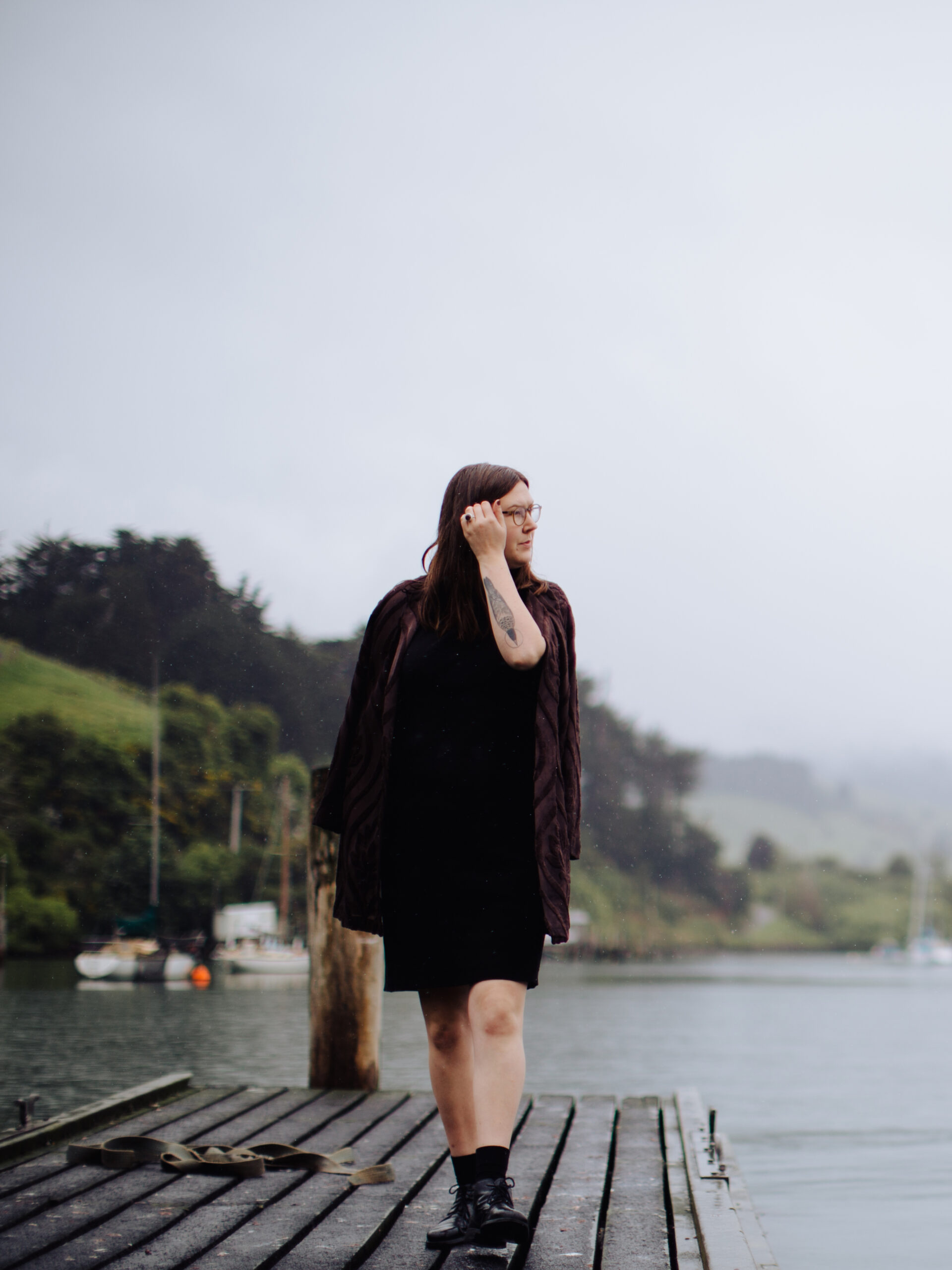

First in Folk
8th May 2025
Nadia Reid is something to behold, live, and her fourth album, Enter Now Brightness is a thing of exquisite beauty and according to The Guardian: “remarkably peaceful and restorative”. Reid is now based with her family in the UK but will be touring in Aotearoa and Australia this December. In 2017 Roy Colbert interviewed Reid for N&S. She seemed to come from nowhere, writes Colbert, and then blew the world away. The republishing of this story for NZ Music Month comes with an added edge of poignancy, for in July 2017, Colbert, the ‘Godfather of Dunedin sound’, would die after a long illness.
By Roy Colbert
Photos: Isabella Harrex
Nadia Reid seemed to come from nowhere. Few singer-songwriters could hope to have a year like the one that tumbled all over her, starting in late 2015.
The girl from Port Chalmers, Dunedin, had self-released her debut album Listen to Formation, Look for the Signs the previous year to a response barely beyond silence.
“I put it out there. I did all the press myself and I was performing, but there was no initial bite,” she says. “After a year, there was nothing happening at all. Then a couple of guys from England came along…”
The “couple of guys” were Andy Moss and Will Lawrence. Moss is now Reid’s manager, and Yorkshire-based Lawrence owns and manages the Basin Rock record label, which is putting out Reid’s new album, Preservation, in March. Moss and Lawrence also helped strap a rocket to Formation, getting the album into the ear-buds of some notable international reviewers – like US music industry bible Billboard, which gave Reid a headline an artist would spend a lifetime looking for: “Nadia Reid, Otherworldly Voice of New Zealand, is Saving Folk Music.” Phew. “A voice as full and warm as felted wool, nimble as a magician’s legerdemain… Reid sings tales of a young, lamenting and lonely heart,” wrote Billboard’s Andrew Flanagan.
Trusted English magazines Mojo and Uncut both awarded four stars and gave her full-page reviews. The Guardian found the album soulful, rich and self-possessed. One of its writers was thrilled not just by the album, “but for all the music that will be made in the years to come”. The paper’s music editor Michael Hann later wrote: “Reid is a remarkably talented, assured, clever and confident singer-songwriter… [has] a devastating youthful wisdom that gives her songs a feeling of lasting pro- fundity.” The New York Times, London’s Sunday Times, the BBC and America’s National Public Radio went down the same effusive path.
All this from nowhere. Her home newspaper the Otago Daily Times put her on the front page when all the overseas reviews rolled in. But locally, she was still playing to 30 people.

”“It was overwhelming at first, and it made me feel a little vulnerable,” says Reid. “It’s satisfying now. It rose over all the uncomfortable bits. What other people say, their opinions, are part of the whole thing, I guess. It’s important, but I need to remember what the whole point of this is.”
Now comes the release of her second album. (New single “Richard” came out in January.) There’s a lot to live up to. Reviewers have this thing about “find- ing someone new” and going out on the ledge. But they’re often tougher on the second album.
Yet Reid is anything but apprehensive. Temperamentally, she seems to hover somewhere between composed and confident. Pragmatic, maybe. She says she doesn’t get nervous before she per- forms; she’s aware of all that is going on, but is unfazed. Reid told one writer she’s never had an on-stage disaster, and the indications are – she’ll turn 26 in August – this just might not ever happen.
“I have a growing sense of feeling comfortable when I’m performing. I was shy as a child and I can still be shy. But I wouldn’t totally call it confident, it’s just knowing when I’m up there, I’m in the right place.”
Preservation is a progression in both sound and life experience. “More about me this time,” she says, though many assumed the first album was largely about her, too. She says she is happier in her own skin now. She promises that Preservation is different, rolling out tales that only experience and touring the world can bring.
Many artists will tell you they don’t read reviews. Many artists tell fibs. Reid freely admits she reads them all. One in US online magazine Pitchfork threw her a bit. In an otherwise positive review, Laura Snapes found Reid’s attitude to love “hopeless”. Billboard, ironically, had found the opposite (“insistently hopeful”), which is closer to where Reid would place it. “I’m learning that people are entitled to their views, but it was the interpretation of what I was writing about I found a little bizarre. Perhaps it was because the writer was a woman.”
Many of the first album’s seven years of songs were written from the eyes and experience of mid- to late-teens. Love itself was seen as a “fiery black disease” and lovers were “creatures of the night”. But the overseas critics consistently found her lyrically wise beyond her years. The songs certainly bubble with memorable lines. Few singer-songwriters could open a debut album more powerfully than Reid does on the stunning “Runway” – “When I hit the ground in all my glory, I will know where I have come from.”
The first European tour last year had everything first European tours have. The sold-out concert in London was the highlight, a magic night where Reid says everyone, musicians and fans, were completely focused. But there were times, too, of loneliness and self-doubt in a host of varying venues, frequent communication barriers, and fatigue. The usual.
“It was so different,” she says. “They don’t have the Kiwi ‘tall poppy’ thing over there. Some nights were great. It was important in making me up my game. If it had been easy, it wouldn’t have been as rewarding. But I did get a manager and a publishing contract with 100 per cent artistic control out of it, so that was really good.”
This year’s European tour, which opened on February 10, is a step up in every way. It will be cold this time, too, even colder than the mid-winter chill of her current base, the tiny artist- and musician-rich township of Port Chalmers, just out of Dunedin.
After working in a series of hospitality jobs since leaving school at 17 (including long stints at Coco’s Cantina in Auckland and the Carey’s Bay Hotel in Dunedin), last year Reid went back home to live with her mother Karin, a jazz singer around the city. In December, she made the decision to go fully professional.
The total commitment to music had been there for a while, after she first picked up a guitar at 15, but it’s a weird old penniless world for a folk singer, if we can call her that – sheesh, so many other people do. Whatever the musical label, Reid is clinging tightly to an artis- tic control of her career that keeps her core values cast in stone: she’s unlikely to ever make TV ads for heat pumps.
Nor will the people around her. Stellar accompanist Sam Taylor told her right from the start he was in it for the music, the feeling, not the cash. Taylor fills out Reid’s glorious melodies with beguiling melodies of his own, making use of the tremolo arm on his Fender Jazz- master. The pair were memorable when they performed Lydia Cole’s “Dream” at the 2016 Silver Scrolls – for many, the standout performance of the night.
They’re together on the European tour. It was perhaps strange Reid wasn’t in that Silver Scroll finals list after the world had heaped so much praise on her music – not unlike Crowded House winning over America in 1987 while still quiet as a mouse in New Zealand. However, Listen to Formation, Look for the Signs belonged to 2015, and she was nominated that year.
Taylor was suggested to Reid by fellow Aucklanders and album musicians, double bassist Richie Pickard and drummer Joe McCallum. The pair are now a tight little team. Both albums were produced by Ben Edwards at his Sitting Room studio in Lyttelton – but no, there isn’t a “Lyttelton Sound”, says Reid. “Just a wonderful and supportive musical community.” Edwards pours perfect soundscapes into the enchanting backdrops that are a feature of Reid’s music; it’s no surprise that a talented cabal of New Zealand artists – and Australian Julia Jacklin – have been queuing up to work with him.
Reviewers have offered all manner of sound-alikes for Reid’s music. Interestingly, pretty much none repeat a name. A friend heard “Runway”, and declared her long search for music that merged Sandy Denny with Enya was over. Nobody else has said that. At the centre though, always, is that beautiful voice.

Reid is a catch-an-idea-when-it-comes writer, stopping whatever she is doing to get it down. She regards wistfully a friend and fellow touring performer, Auckland-based Anthonie Tonnon, who has a much more rigid writing discipline. She has kept a journal forever – “I’ve been into words and telling stories right from the start” – and all the thoughts, lines and ideas that come at any time go into its pages. Her late grandmother and influential mentor Noeline Dunn once recalled Reid as a five-year-old, making up songs in the back seat of the car.
Waiting for the ideas to come can be a little risky, of course, and she admits there have been blocks. But Reid has learned ways around that. She lives and records by the sea. The first album has a number of references to the ocean.
“The water has become a really familiar thing for me. I’m so lucky to live where I do, 10 minutes to the most rugged and beautiful beaches. I do a morning walk around the harbour when I can. It’s incredibly grounding and inspiring.”
Songwriters’ hearts swell when their work is covered by others. Whom would Reid like most to sing one of her songs? “I’m in awe of the New Zealand writers I grew up listening to in my teens. Anika Moa, Don McGlashan, Dave Dobbyn and Julia Deans. I remember when Don came to one of our shows recently, I was so honoured to have him there. So yes, any one of those four!”
Her 2016 Australasian tour finished at the end of the year in the performance bar behind Dunedin’s Plato restaurant: a packed house with a wide age sweep, nowhere near enough chairs, Reid’s mum Karin on the door stamping the backs of hands, eyes shining. I once found myself sitting next to Karin at a Nadia Reid show. If you ever want something to pull you away from the life rubble we all clamber over each and every day, watch a mother watching her daughter perform in public.
“I have all the myriad feelings of a protective parent,” admits Karin. “Naturally, I’m immensely proud of Nadia’s quiet determination and achievement… her creativity and courage. And the joy of listening to her pure voice.”
It’s a great night. Contemporary folk music is arrestingly strong in New Zealand right now. Marlon Williams, Aldous Harding, Ciaran McMeeken, Ben Woolley and Delaney Davidson are among many currently scuttling for a place beneath the folk umbrella, and this is underlined by a superb support set from Sean Donald and Flora Knight. Fiddle and guitar, both singing. Close your eyes and it’s music from a crackling old American country and western radio show. “Does anyone here know Lefty Frizzell?” asks Knight. Frizzell would be three-and-a half-times Knight’s age if he were still alive.
Reid follows on seamlessly from Knight, her old friend from Logan Park High. The warm, deep tones from her prized Crafter guitar – “a custom-made signature guitar… they sent me two!” – help cover the absence of her albums’ double bass-cello carpet. The new songs are memorable.
In the 30-people days, Reid would just stand up and sing. Nothing fancy. Now, she’s going to need all that other stuff managers pound their fists about. But her stage chat is fast catching up to the warmth of her reviews. “Do you want a song about Port Chalmers, or one about making bad decisions?” she asks the audience.
Wry. Self-deprecating, but not too much. Nadia Reid will be just fine.
This story was first published in North & South in March 2017.
